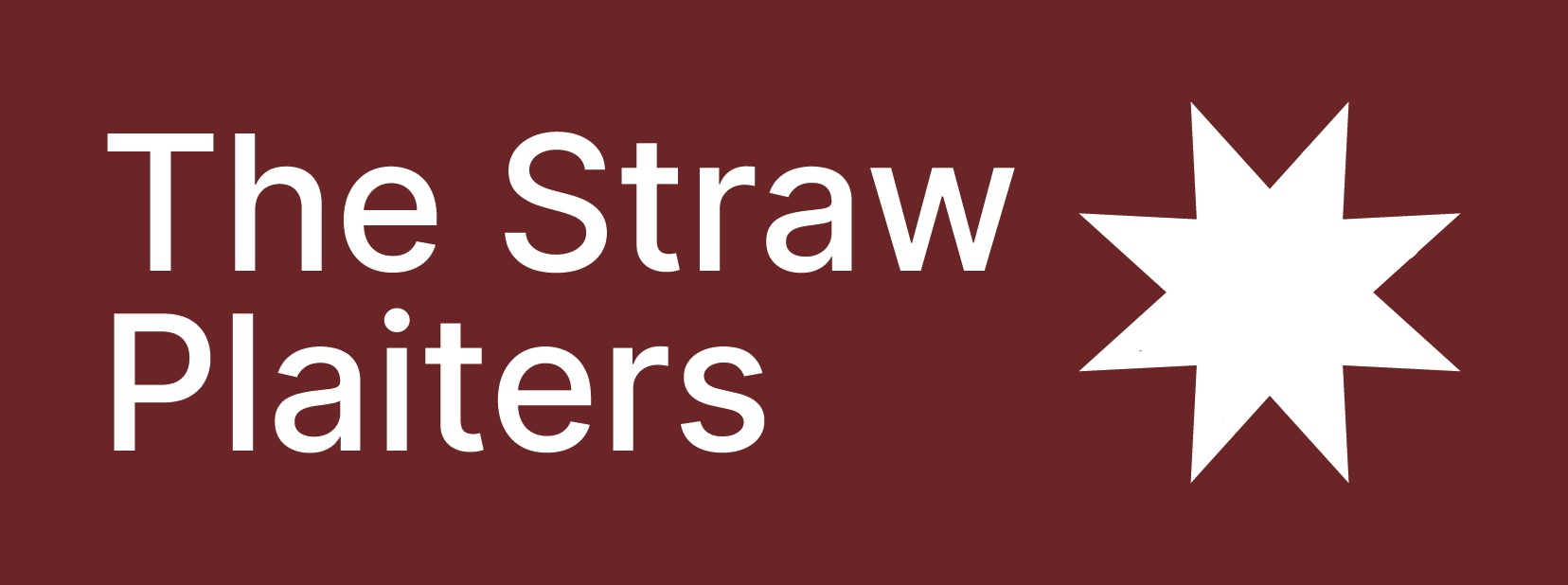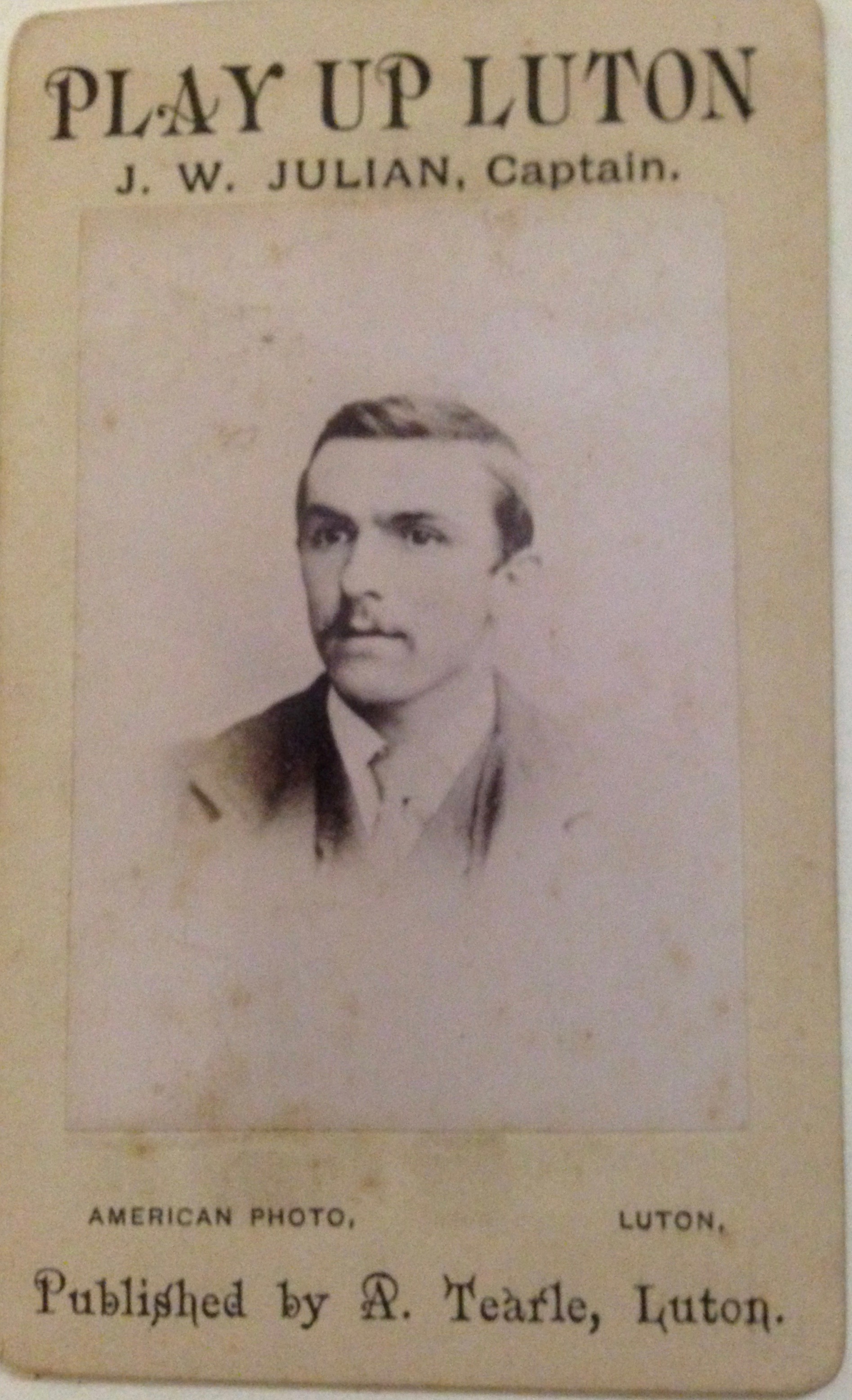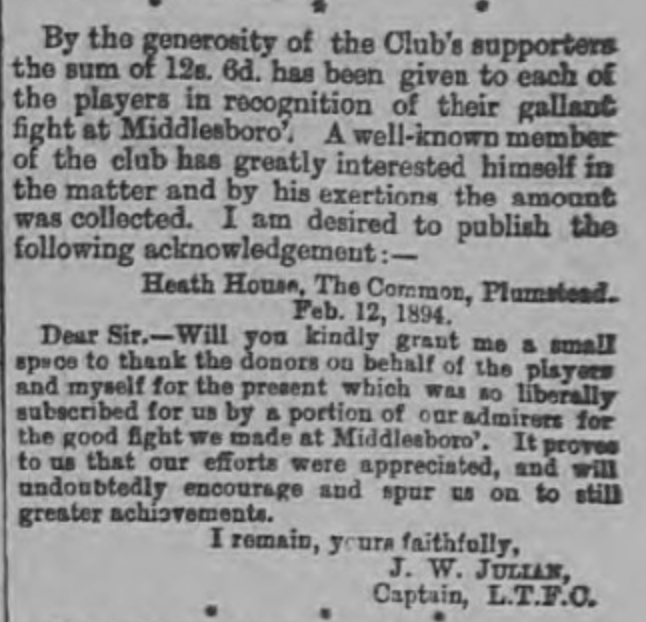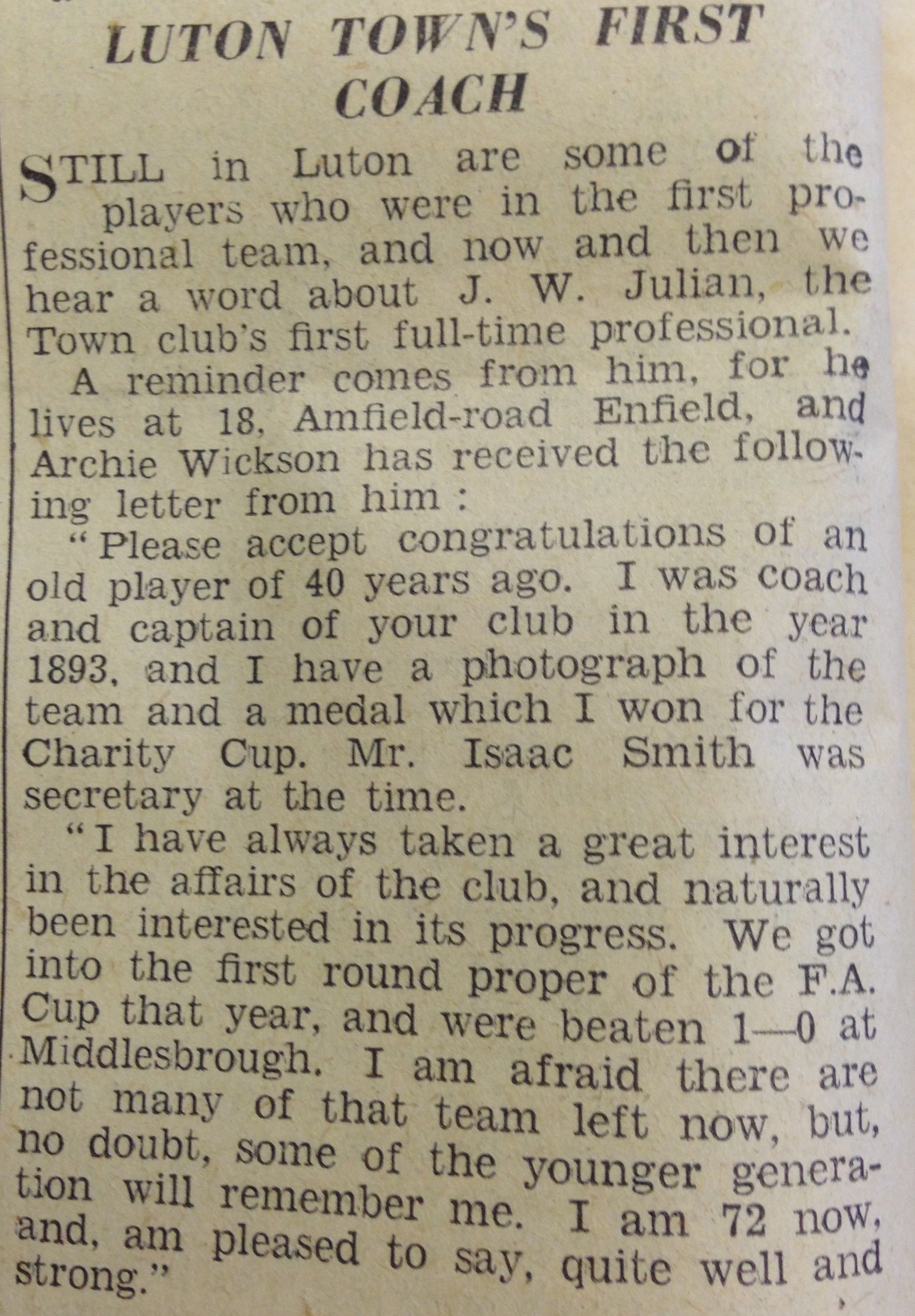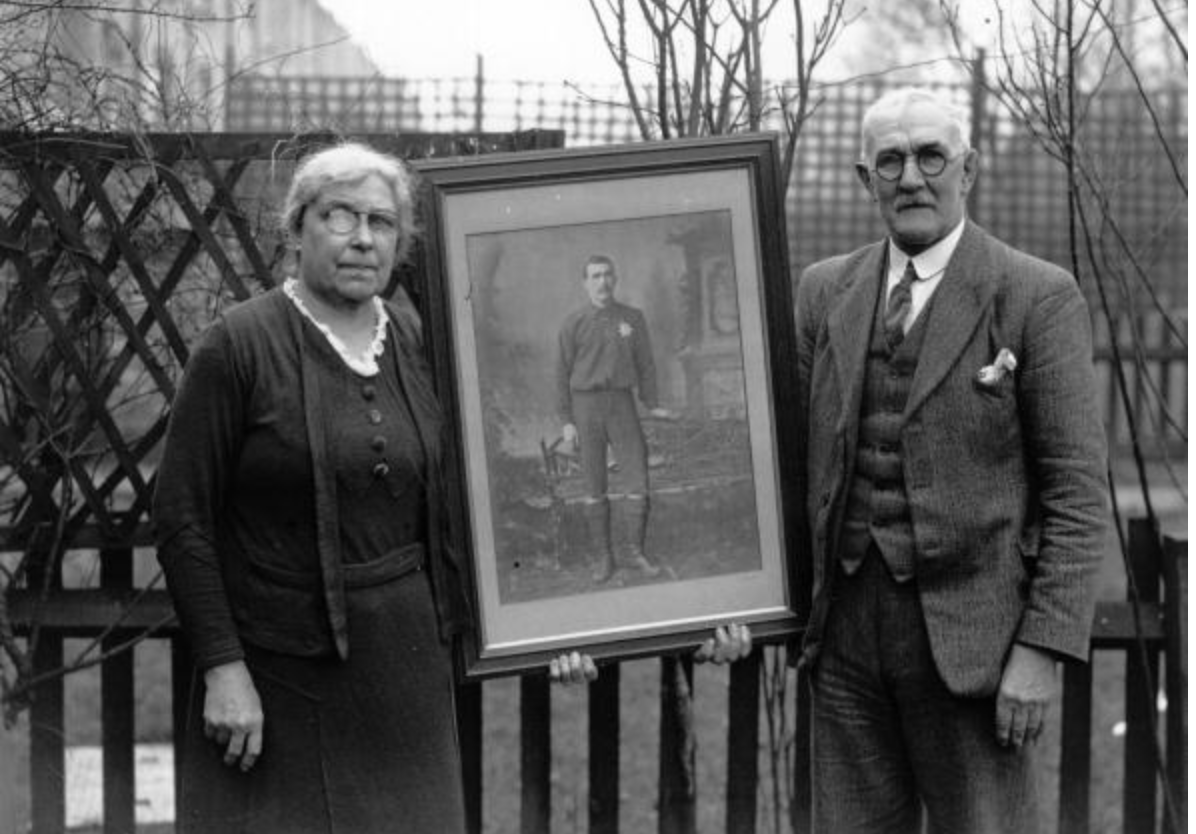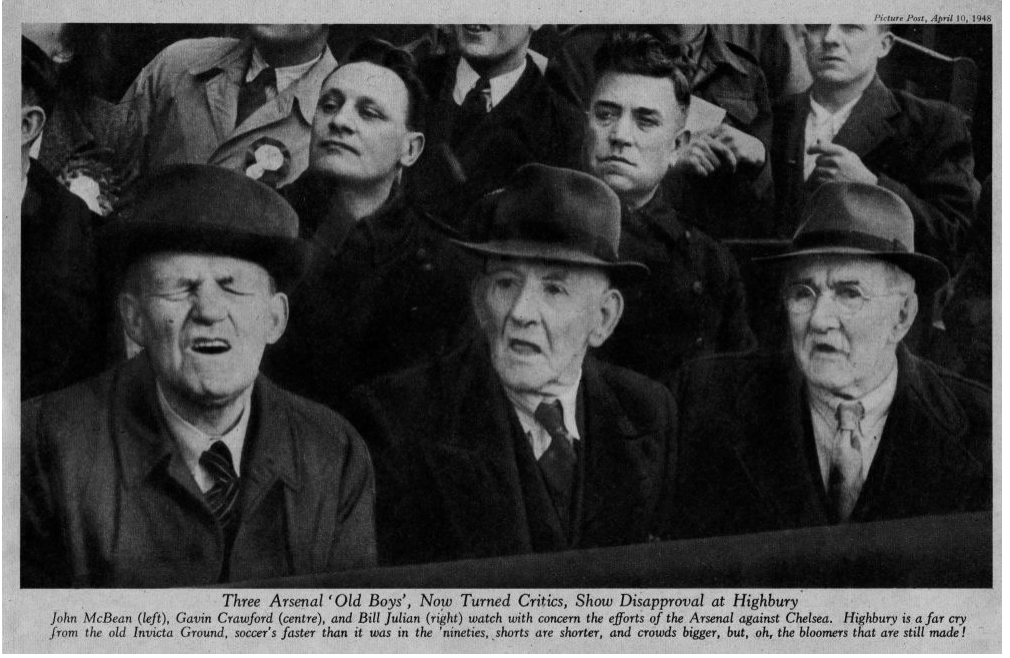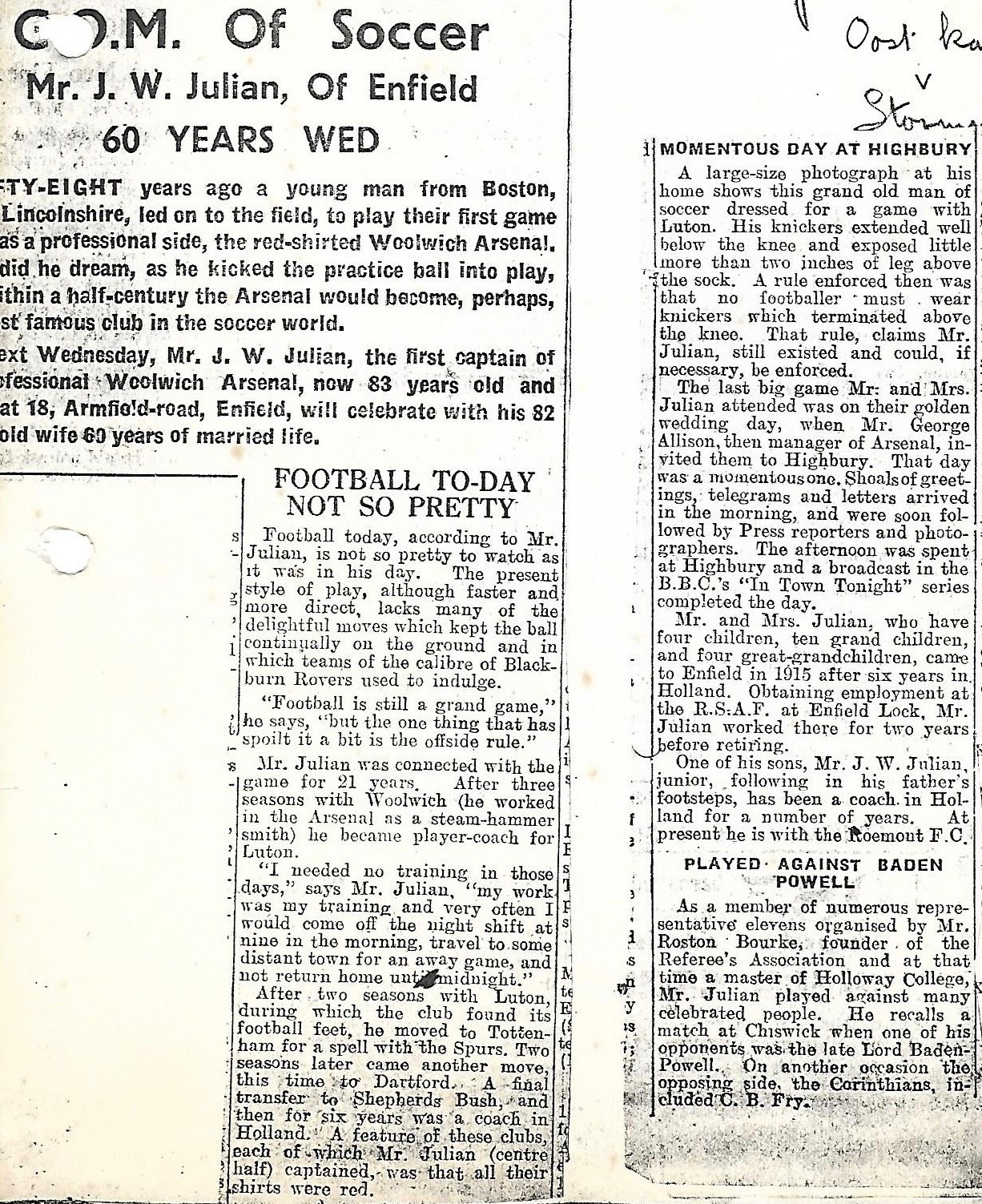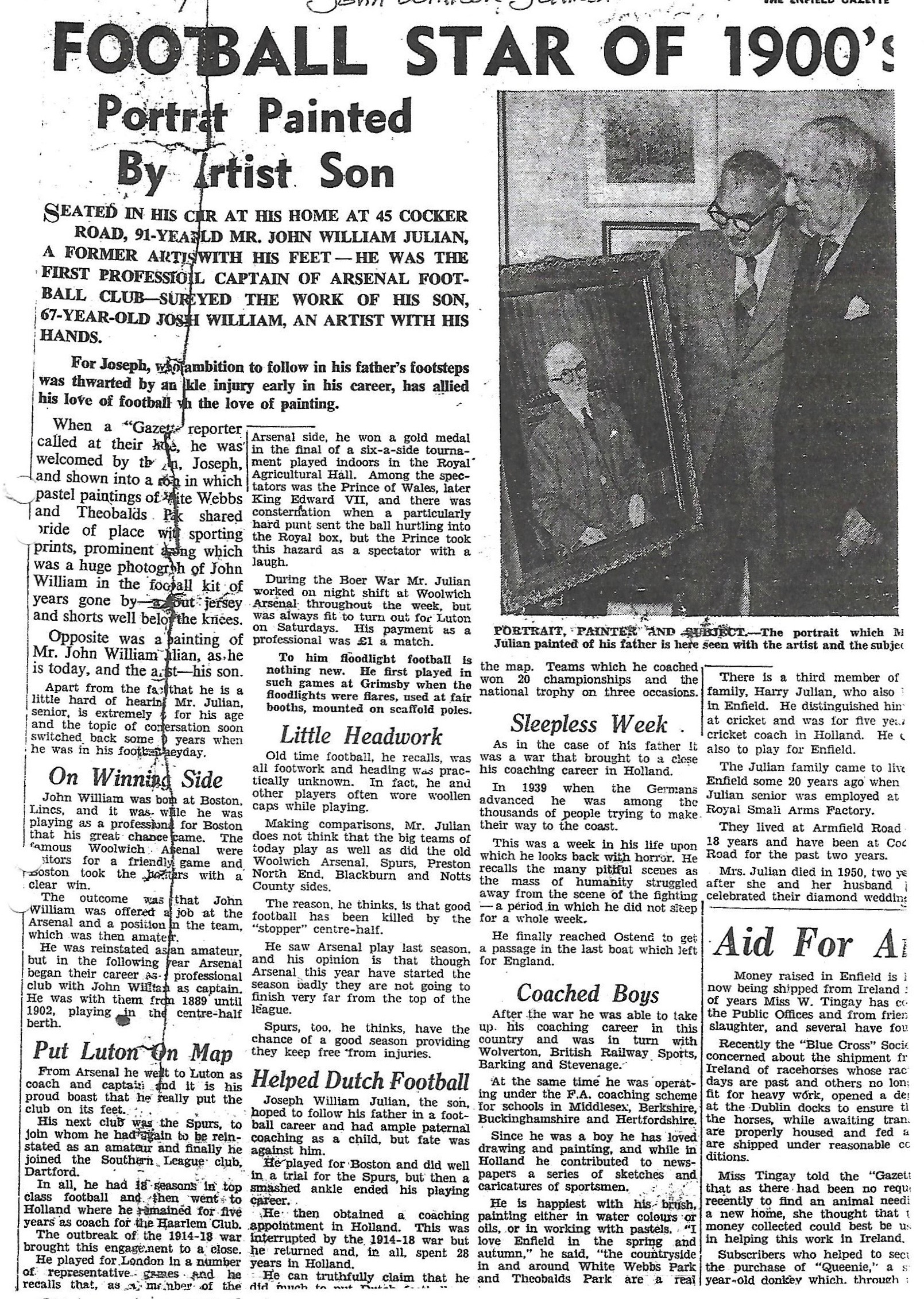John William Julian
Born 9th July 1867. We are fortunate to have a profile of John William “Bill” Julian which was published in the Luton News of 8th September 1892.
“Footballers in different parts of the country have already entered upon their favourite winter pastime. On Saturday enthusiastic lovers of the game will be kicking their heels around the ropes on the Dunstable-road ground, anxious, oh, how intensely anxious! to get an idea of the manner in which the Luton team will shape up during the coming season. Naturally the greatest interest will be shown in the new centre half-back, who is a total stranger to the district, but of whom great things are expected. J.W. Julian – that is his name – comes to us from the Royal Arsenal, having transferred his services from one team of “reds” to another. Perhaps a few words as to his past history will not be out of place. To begin at the beginning, Mr. – he was only then Master – Julian was born at Boston in Lincolnshire, on July 10th 1867, and is consequently 25 years of age. He was a sturdy youth from his birth upwards, and took to football in a regular way when he was sixteen years of age, then joining a local club called the Excelsiors. His abilities as a player soon made him prominent, and he was spotted by the premier club of the town and induced to join their ranks. The following season saw him captain of the team, a position which he filled for two years, taking part in all cup ties and ordinary matches during that period. He was prevailed upon to come to London to join the Royal Arsenal after the latter had paid a visit to Boston and suffered defeat to the tune of five goals to two. He has been connected with the Royalists for three seasons, and he had the honour of captaining the team during the most successful part of the club’s career. While playing with them, previous to their taking to professionalism, the Arsenal won the London Cup, and Kent Charity Cup and London Charity Cups. Julian has played both or London and Kent County, and had gained six medals since being at Woolwich. He was also one of a team of six picked Royalists who competed for the shield of the National Physical Recreation Society is a six-a-side contest at the Agricultural Hall, and they won the trophy, beating London Caledonians in the final round by one goal to nil. Upon this occasion the had the honour – I suppose it must be called an honour – of playing before the Prince of Wales. Last season Julian played for the Arsenal in several of their first team engagements, but the greater part of the time saw him as captain of the Reserves, as he had to stand down to make room for the highly-paid Scotch importations, who in the opinion of man, failed to show up as well as the old amateur team had previously done. The performance of the Arsenal Reserves, however, was a very excellent one, as they lost but two matches during the whole of the season, and those two by a goal each only. Julian has not always been at centre-half. He has filled every position in the field, except that of goal-keeper, in the course of his career, but his favourite place is at half-back. He has played against most of the leading clubs of England. His height is 5ft. 9ins., and his weight is 11st 13lb., so that physically he could not have been better suited for a half-back had he been built to order. The papers speak very highly of Julian, the Star, which gave a portrait of him twelve months ago saying, “Of the Royalists’ many champions, J.W. Julian is not the least. His position is at half-back, where his strong tackling and judicious placing of the ball are invaluable to his side. Julian can playa good game at forward when required, and has had the honour of representing London. The following are a few brief extracts from the Woolwich papers:-
“J.W. Julian has, I should think, made and beaten all records as far as Plumstead football is concerned, for he has played and shown consistent form in every one of the first team’s engagements this season (1890).”
“Julian played his old game. Great credit is due to this grand half, for without taking care of oneself it would be impossible to come up to the scratch in such fine condition as Julian on every occasion shows.”
“All three of the halves did their work brilliantly. Julian has never played better than he did on Saturday. This is saying a great deal of a man who has always played a sound and consistent game.”
“I thought Julian was the best man on the field. The way he shadowed his opposing wing was a treat to witness.”
I might go on adding any amount of testimony to Julian’s ability, but the above will be sufficient to show that the Luton executives, in engaging him, cannot be accused of having brought a “pig in a poke.” His credentials are of the highest order, and though the place vacated by “good old Paul” is a difficult one to fill, there seems to be every reason to believe that Julian will prove fully equal to the task.”
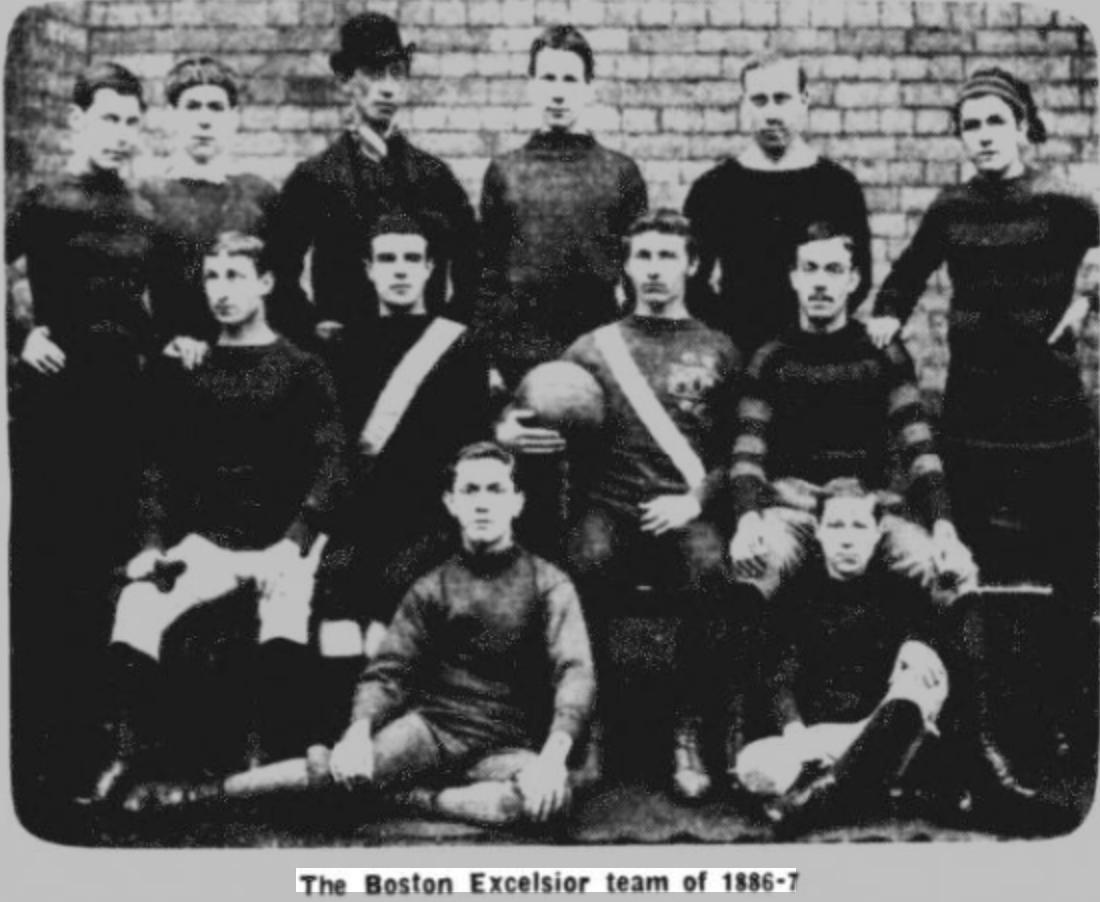 Here is Bill, above, in the Boston Excelsior team of 1886/87, back row, extreme right.
Here is Bill, above, in the Boston Excelsior team of 1886/87, back row, extreme right.
Bill continued to live in Plumstead after his signing. The 1891 and 1901 census returns show his occupation as a Blacksmith. The Club gave him a substantial wage (the other players were paid 5/- a week) plus his train fare from Plumstead for the games. We are not given his exact wages but for the second season he was paid 15/- all year round (as opposed to a larger sum during the season and a lesser sum during the close season).
Bill was immediately made captain of the team and the committee put their trust in him to deal with tactical and disciplinary aspects straight away. The committee asked him to speak to the team in September 1892 as there was some jealousy within the team which was affecting performance. The committee also asked him on occasions to bring some players with him from Plumstead for a trial. Royal Arsenal had 20 professionals on their books and some would have had the same attitude as Bill and wanted first team football.
He proved to be an inspirational signing by the committee. His two years at Luton saw the club make the short but difficult road from the pack, to the third best team in the South of England (with the Royal, later Woolwich Arsenal way ahead at the top and Millwall slightly ahead of the Straw Plaiters). It was a remarkable rise and Bill should take his share of the credit. A tough no-nonsense half back he lead by example. In the 1893-94 F.A. Cup the Straw Plaiters met the Old Westminsters away. This was a formidable test and Bill saw the danger and marked the dangerous centre forward, Sandilands, out of the game. His no-nonsense clearances and tough tackling helped the club to a famous victory. It was this victory that made the football world stand up and take notice of Luton Town Football Club.
Bill led the team into the first round proper of the 1893/94 F.A. Cup where they faced Middlesbrough Ironopolis. A narrow 2 1 defeat did not tell the full story as the Straw Plaiters were thought by the neutrals to be the better team. The supporters were very proud and the Luton Times clip of 16th February 1894 (below) takes up the story.
A consistent all round player, Bill had an eye for a goal and was a good header of the ball – the latter being quite a rare attribute at this time. As captain he pushed his men forward as in the home game with Millwall in January 1894;
“The Luton men slackened off somewhat, and with inexcusable stupidity the visitors did not see their opportunity, and also allowed their pace to slow down. Then Julian told his men to “gird up their loins,”….”
The Straw Plaiters went on to record a famous victory over Millwall, the early favourites for the forthcoming Southern League title. Later in 1894 he led the club to their first trophy, the Luton Charity Cup. After a four one victory over Wolverton L. and N.W. he was presented with the trophy (see Library, Luton Charity Cup). The Luton Reporter takes up the story;
“Mr. Julian, who was enthusiastically cheered on carrying off the cup, was saluted with cries of “Speech.” In response, he said he was heartily pleased to receive that beautiful cup on behalf of the Luton Club. They had tasted the bitters—(laughter)—and now they had got the sweets of victory (applause). He was sure no one in Luton was more proud than he of the victory, and he was certain that all the other players were pleased. Their opponents appeared to him to accept their defeat in a very sportsmanlike and honourable manner (applause). The game was not what could be called a good game, but there was no doubt that it was a very fair game. He hoped the club would succeed in doing better things (loud applause).”
A dispute about out of season wages caused Bill to resign from the Straw Plaiters in May 1894. The committee appear to have valued forward players more than a half-back. The centre forward Hugh Galbraith was offered 30/- a week on signing in 1892 yet Bill was on half that. It was a poor decision by the committee as Millwall went on to win the first Southern League season by a narrow margin. Bill’s leadership, physical presence and discipline might have proved the difference. After leaving Luton Town, Bill signed for Tottenham Hotspur. In late 1894 he was approached by Nettie Honeyball who had placed an advert in the newspapers for 30 young ladies to join her British Ladies Football Club. Bill agreed to coach the ladies.
He played in Spurs very first F.A. Cup tie on 13th October 1894 when they beat West Herts 3-2 n the first qualifying round. He left a year later and finished his career at Dartford. He opened a sports shop in Plumstead but left for the Netherlands where he coached many teams including Feyenoord, MVV, HBS, Be Quick 1887, GVAV and Willem II twice.
From the Luton News of 20th January 1938.
Bill and his wife on their golden Wedding Anniversary, 3rd February 1938
At an Arsenal game in 1948.
J.W. died on the 14th March 1957
I am indebted to Jean Douglas-Wood for providing the following newspaper clips. The first is from 1938.
The next two clips are from 1948.
The final clip, below, is from 1957 just before Bill’s death.
Jean also produced the following history of Bill’s life which I have reproduced without change.
“John William Julian b. Boston, Lincolnshire 1867 and d. Kettering, Northamptonshire 1957 at the age of 90.
The 1902 census records him as a blacksmith employed at the The Royal Arsenal and living at 11 Bebbington Road, Plumstead, London. But he was so much more than that. It is our family’s understanding that John William Julian and his sons Joseph William Julian and Harry Julian did a huge amount to put European football on the map and in that respect, we all feel as a family that their contributions have not been fully recognised.
Known as Bill, he was the son of William Julian and Ellen Mawer of Boston Lincs, one of 9 children. His father William was a Yorkshireman born in Beverley and his Julian ancestors have been traced back to the 1500’s in that county.
Bill joined Boston Town FC at the age of 18, apparently using local public houses as changing rooms near to where the match was held. He was at Boston Town from 1885 to 1889 playing professionally as captain. According to a newspaper article it was as the result of their defeating the then amateur Woolwich Arsenal in 1889 that the 22 year old Bill was ‘poached’ from The Poachers.
He was offered a job at The Arsenal as a steam hammer operative.
The year before he left for London, Bill had married Edith Emerson in July 1888 and their first son Joseph William Julian (also to be known later as Bill) was born in 1889 in Boston before they left. Bill Jnr was to later follow his father’s footsteps by playing for Boston Town, presumably staying with his grandparents while he did so. There is a picture of him in the line up of 1909 on the year that Boston won the Hospital Cup.
Bill and Edith went on to have 3 sons and a daughter in all.
Note. The photograph of the 3 old boys of Arsenal (John Mc Bean, Gavin Crawford and Bill Julian) at the Arsenal V. Chelsea match in 1948 at Highbury was part a set taken by Picture Post, only one of which was used ( Vol 39 No2 April 10th 1948)
Apparently during the Boer War, Bill worked 5 night shifts a week and stated that he was always fit enough to turn out for Luton on a Saturday. In one article it records that he was paid £1 a match, which doesn’t seem much these days, but undoubtedly was a great deal then, although nowhere near the gross amounts that today’s footballers are paid.
In the Enfield Gazette article of July 1948, recording his 60th wedding anniversary, he was described as having been ‘one of the best half backs in Southern England’ and goes onto say that ‘Under his leadership, the Arsenal won the Kent County, London and London Charity Cups’. One of his treasured possessions was his London Cup 1892 gold medal, which tragically, has been stolen some years ago from the family archive along with other significant memorabilia.
As well as playing football, he also managed to find time to win a medal at skating and once rode a penny farthing for 75 miles! Society doesn’t make many men like that anymore.
In another unidentified newspaper clipping, discussing his fitness levels, he said that
‘I needed no training in those days, my work was my training and very often I would come off a night shift at nine in the morning, travel to some distant town for an away game, not returning until midnight.’
In all, Bill had 18 seasons in top class football. He reminisced, in one newspaper article, about playing a six a side match, as a member of Arsenal, at the Royal Agricultural hall. According to The Enfield Gazette c1956 ‘Among the spectators was the Prince of Wales, later King Edward VII, and there was consternation when a particularly hard punt sent the ball hurtling into the royal box, but the price took this hazard as a spectator with a laugh.’
He also played against Baden-Powell at Chiswick, as ‘a member of numerous representative elevens’.
After retiring from football as a player, family anecdote has it that he opened and ran a sports shop in Plumstead but no-one can work out where it used to be or when it was open. However, it must have been along the walking route to the nearby stadium because family memory states that he had a wooden model of a footballer with articulated legs in the window of the shop. He would cause the manikin to kick a brand new football into the crowd of fans on match days, the person who caught it, keeping it.
In around 1906 family record has it that Bill was contacted by the then fledgling Dutch Football Association and was asked to help coach some Dutch teams.
So, Bill and his wife and children all re-located to Holland, which began a close relationship with the country that still persists today in some of his descendants.
The family stayed out in Holland until the outbreak of WW1, Bill during that time having coached Maastricht, VVV Venlo, PSV Eindhoven and HFC Haarlem ably assisted I believe by Bill Jnr in later years and perhaps son Harry was later associated with Maastricht FC. There are several rather faded old newspaper clippings from that time within the family archive.
He may have managed HBS Den Haag and Feyenoord Rotterdam from between 1921-22 after a brief return to Holland after the war, the family are not sure whether this was Bill Snr or Jnr.
On the Feyenoord team website, discussing the history of the club, the team was described as ‘an ambitious club but had to wait until 1921, when thanks to the services of an Englishman Bill Julian, they finally gained promotion to the top flight’
In 1938 Bill and Edith celebrated their 50th wedding anniversary. They were invited to a football match at Highbury, by the then manager George Allison. They had a busy day full of greetings, telegrams and a press report. Amongst the telegrams was one from JC Carnell of the BBC inviting them both to take part in the live broadcast of Radio’s ‘In Town Tonight’. It is unknown whether this recording still exists.
Bill is remembered in the family as a hard working and genial fellow. He died sadly in the very same year (1957) as his eldest son Bill Jnr. Both of them living in a small place in Kettering.”
Bill died in Enfield in 1957 aged 89.
Thanks to;
Jean Douglas-Wood.
The Luton News
arsenalonetwofive.wordpress.com
Roger Wash
Getty Images
